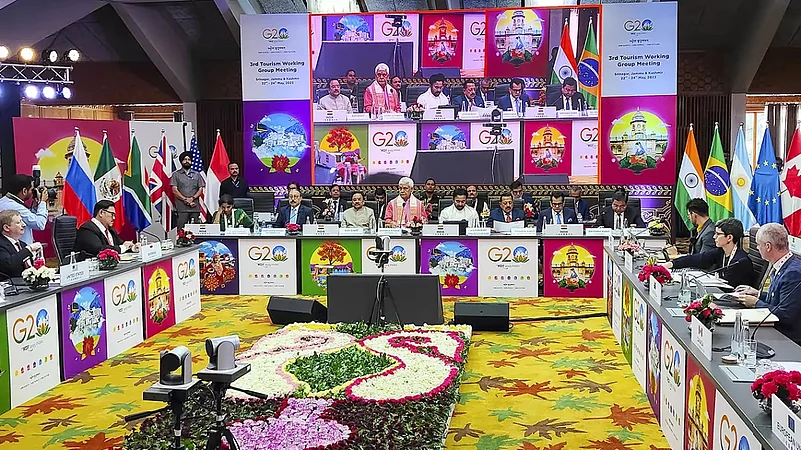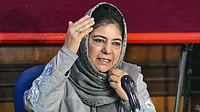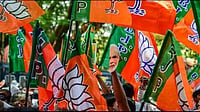With the conclusion of the G20 tourism working group meeting on Thursday, a sense of calm has returned to Kashmir Valley with top officials sending congratulatory messages over its “success”.
For the first international meeting in Srinagar after the abrogation of Article 370 and downgrading of Jammu and Kashmir from a state into Union Territories of J&K and Ladakh, the government had made elaborate arrangements.
The roads leading to the venue were sealed off and several local schools were closed during the event held at Sher-i-Kashmir Convention Center on the banks of the Dal Lake. The elite naval commandos and CRPF’s elite marine commandos were deployed at the Dal Lake to thwart any militant attack.
Jammu and Kashmir Police said that Kashmir Police Chief Vijay Kumar congratulated officers and personnel of Jammu and Kashmir Police, Centre Reserve Police Force, Army, Border Security Force, SSB, NSG, MARCOS, NDRF and intelligence agencies for conducting incident-free and successful G20 Summit.
The government had removed concertina wires from security bunkers enroute the event. The bunkers were also remodelled and painted in blue and squeezed in size and roads were renovated. The government also made Srinagar’s city centre Residency Road and Polo View markets pedestrian-friendly market and took many delegates to have its view.
While the event was about tourism and promotion of film tourism in Jammu and Kashmir, the significance of the place of the event, Srinagar, attained more importance as Pakistan had objected to holding the event in Srinagar and China had announced it would skip it. Besides China, G20 members Saudi Arabia, Turkey, Oman, and G20 guest country Egypt didn’t attend the event.
“Earlier, if you had an event like this over here, a hartal call would be made from Islamabad and shops would be shut at Residency Road, Srinagar,” Union Minister of State (Independent Charge) Science & Technology; MoS PMO, Personnel, Dr Jitendra Singh, said addressing one of the meetings, thus explaining the importance of the place of the event to the guests. He said at present the situation is different. He said the mindset of people has changed as they do not need to pay the strike calls issued from Pakistan and or by some people in Srinagar.
“A common man has moved on. You do a quiet survey, you will find a common man walking in the streets of Srinagar wants to move on,” he said. Later talking to reporters on the sidelines of the G20 event, he said that the way the G20 event was conducted in Srinagar sends a message to the world that the people of Kashmir have moved to the development and progress of the country and Jammu and Kashmir.
During his media interaction, Lieutenant Governor Manoj Sinha without mentioning the abrogation of Article 370 said: “In the last four years, policies and programmes have been reshaped so that the benefits of growth percolate to the masses and nurture nature. In the tourism sector, there has been an unprecedented increase in the tourist footfall after the second wave of covid pandemic and we were happy to host over 18 million tourists last year.
“By adopting a whole government approach, an ecosystem of terror sponsored by our neighbour has been almost dismantled. Today’s Jammu & Kashmir is not a land of hartals or stone pelters. It’s a land of peace and prosperity that responsible and responsive administration is trying too hard to bring in lives of the people.”
A Srinagar-based political analyst said that “the G20 event in Kashmir is a replica of Jashn-i-Kashmir of Bakshi Ghulam Mohammad's rule in Kashmir. Bakshi’s political stand after Sheikh Abdullah’s arrest was ‘all is well’ in Kashmir.”
The analyst added, “The event like G20 had its own significance when held in Srinagar even though held in tight security. Ostensibly it may be about tourism. But it was all about politics. With US and European delegates coming for the meeting indicating shifting of the stance from the western powers on Kashmir.”
Traditionally, Americans were aggressively involved in Kashmir right from 1948 and were seen as Pro-Pakistan on Kashmir. In 1995, President Bill Clinton appointed US diplomat Robin Raphel, the first Assistant Secretary of State for South Asia (the post later included Central Asia). She was a known figure in Srinagar as she was a frequent traveller to the Valley when she served at the US Embassy in Delhi during 1991-93. She had at a diplomatic event described Kashmir as a dispute and had suggested of a referendum.
While American diplomats and leaders like ambassador Frank Wisner and senator Frank Brown regularly visited Kashmir Valley in 1990s, meeting separatist leaders and other civil society actors, Americans no longer hold any such meetings.
On Thursday evening, Lieutenant Governor Manoj Sinha visited the Jhelum riverfront, which has been given a facelift to showcase the development of Srinagar to visiting G-23 delegations.
“I have also been informed that the ongoing 3rd Tourism Working Group Meeting in Srinagar is the biggest gathering of foreign delegates so far. I think it is bigger than previous TWG meetings in Siliguri and Gujarat, and except China, all G20 nations delegates, representatives and other stakeholders of tourism industry of the respective countries are participating in the event,” Sinha claimed in his address.
China had said it will not attend the meeting, citing its opposition "to holding any kind of G20 meetings in the disputed territory". In April, Pakistan, which is not a G20 member, had voiced its “strong indignation” over India's decision to hold the meetings in Kashmir, calling it a “self-serving” move on New Delhi’s part. External Affairs Minister S Jaishankar had rejected Pakistan’s objections, saying Pakistan has “nothing to do with the G20, nothing to do with even Srinagar and Kashmir.” “Wake up and smell the coffee, as Article 370 is history,” Jaishankar had said.
“There is every reason for the government to rejoice over the event as it seems necessary to create an international legitimacy of the constitutional changes it did in 2019 and this time Americans are on its side and Pakistan couldn’t do anything,” said a Kashmir-based analyst pleading anonymity.
The Director General of the Police Dilbagh Singh in his message also mentioned Pakistan saying, “historic three day G20 event (May 22-24) comes to an end with delegates taking a flight back and leaving behind all good memories to be cherished by the people of Jammu and Kashmir for long. This event has opened new vistas and hopes, denouncing many myths and fake anti-Kashmir and anti-peace narratives based on falsehood and propagated by our neighbouring country.”
“People of Kashmir deserve special compliments for seeing through the falsehood of Pakistan's narratives and welcoming and participating in the event in every way wholeheartedly. The delegates not only enjoyed the beauty of Kashmir but also lauded the local people and their hospitality,” the statement said.
“The security arrangements made for the event were least obtrusive, ensuring full normal life and business for the people,” he said. “Police and security forces arrangement were people friendly.”


























